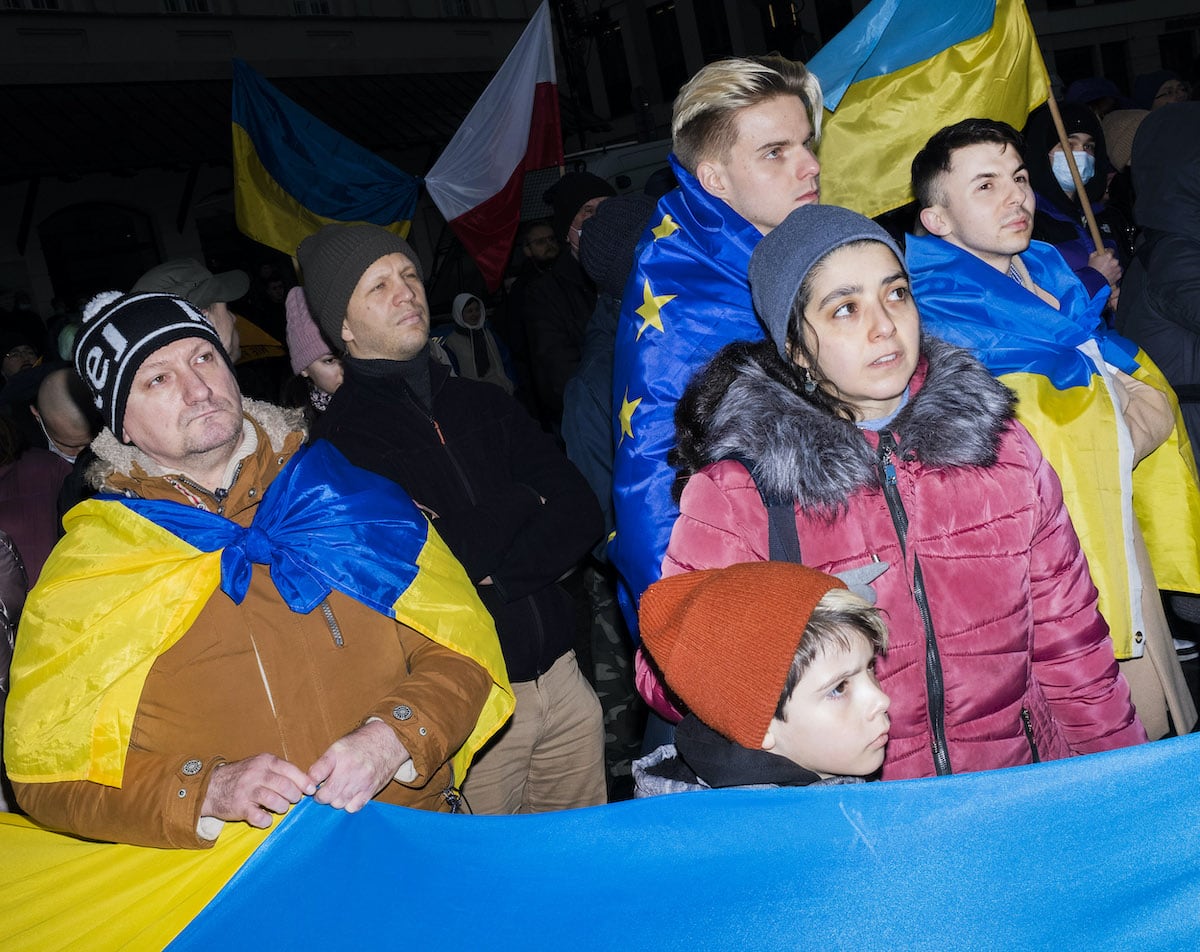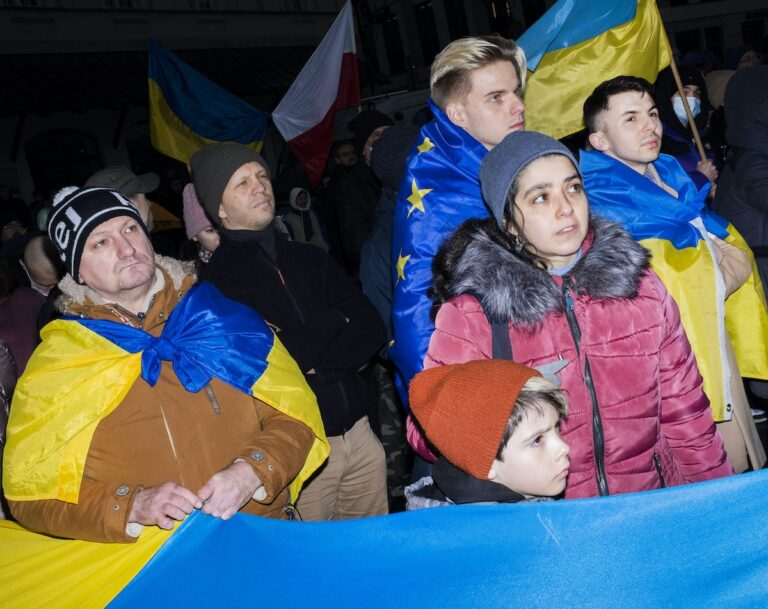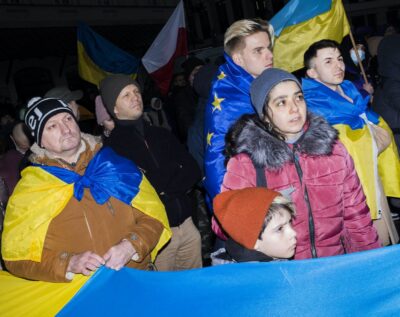The Russian assault on Ukraine has allowed the Polish government to present itself as a pro-EU state, even as it remains an illiberal regime.
This article was originally published by Investigate Europe
Nothing has been the same in Poland since Thursday, February 24. Russia’s attack on Ukraine has turned the tables.
In Poland, which survived for more than 40 years as a satellite state of the USSR, attitudes towards Russia are complicated. For the elite, knowledge of Russian culture (film, literature, music) is fundamental. An educated Pole must know Dostoyevski and Shostakovich. On the other hand, there is enormous resentment towards the autocratic and imperialist Putin. The mood in a nutshell? Oh, Russia, great people, terrible government.
There is also the legacy of history, of 120 years of partition, of Poles being sent to Siberia, of the destruction of the intelligentsia, of forced ‘Russification’. And there is the legacy of Moscow believing that it is superior to its neighbours, so the latter should live or die as Russia wished. That is why, for Poles, the dream allies are the USA and NATO — big, strong, deterrent. In such company, one can feel safer when facing an unpredictable Russia than among diplomats from Brussels.
The German surprise
When Putin attacked Ukraine, the Poles could happily nod and say, ‘Did we not tell you?’ In addition to this schadenfreude, for the first time, the public’s attention was drawn to European politics. First, there was the haggling over the scale of sanctions (will Russia be excluded from SWIFT or not? What about Nordstream 2?) and then came Germany’s unexpected switch of its defence policy.
Nobody expected this in Warsaw. Certainly not the pro-government media, which attack Germany day and night —they lost ground in one day. The anti-German politicians had to swallow this bitter pill with humility. After more than a week of war, today, even a murmur of anti-EU sentiment in public can trigger an avalanche of criticism from both sides of the barricades.
Poland — a country of 38 million people on the EU’s eastern border and NATO’s eastern flank. For seven years, it has been ruled by the anti-EU Law and Justice party, de facto single-handedly by Jarosław Kaczyński. The landscape of Poland in recent years includes blatant disregard of the judgements of the European Court of Justice; anti-EU populism; instilling fear in society about non-existent refugees; xenophobia; violation of women’s rights and persecution of LGBT minorities. Courts are politicised – and Covid-19 recovery funds from the EU have been suspended due to violations of the rule of law. The Polish government has achieved mastery in copying the steps of its Hungarian friend Viktor Orbán, a role model on how to spar with the much-disliked EU.
Becoming pro-EU overnight
The Russian assault on Ukraine allows the government to play a new card that has not yet been played: that of a pro-EU state, open to alliances while remaining an illiberal regime.
Even on the first day of the war, at a demonstration outside the Russian embassy in Warsaw, I heard murmurs of resentment when one of the speakers mentioned Germany. Ah, the Germans. Short-sighted, manipulated by Putin, dependent on Russian gas (on which, by the way, Poland still depends a lot). Germans are pragmatic and cautious, while Slavic souls flex their muscles and send Putin to the place where the defenders of Snake Island sent the Russian ship when they hear about the attack on Ukraine.
The 180-degree turn of the Germans has silenced these murmurs. The Warsaw street believes that in the face of danger, the Germans have shown that they can afford to act decisively.
Good refugees vs the others
Since the summer of 2021, there has been a positional war on the border with Belarus. Poles are not letting in refugees who are being drawn to Belarus by Lukashenko’s regime. The dictator’s men are drawing them from all over the world: from Syria, Afghanistan and Yemen, and pushing them across the border into Poland. On the Polish side, the border strip — several kilometres wide — has been cut off from humanitarian aid and is inaccessible to journalists. Polish border guards catch the refugees and take them back to Belarus, ignoring the protests of citizens and aid organisations.
Suddenly, on the second day of Russia’s attack, the Polish borders were opened. A wave of refugees from Ukraine started to arrive in Poland, and thousands of Poles went to the borders to help — to bring clothes and food, to transport Ukrainian families into the country. Poland, which has been expelling — refugees for over six months, is suddenly opening its gates. Within the first few days of the war, almost 600,000 Ukrainian citizens entered the country. Estimates say that up to 5 million will enter. No country in Europe has yet welcomed such a crowd in one week.
The consequences for Poland will be historic. And certainly bumpy.
Some Western journalists are presenting the situation on the border as an example of racism, with Poles preferring to accept white, Christian Ukrainians rather than refugees from the Arab world or Africa.
This is only part of the truth, and to understand it, you need to know the context. Ukrainians have been in Poland for a long time, and –more than a million of them are legally in the labour market. ATMs and ticket machines in Warsaw include the Ukrainian language, and there is not a single person in Poland who does not know a Ukrainian family. Therefore, those war refugees are much more “familiar ” than newcomers from other countries, and the similarity of both languages also helps.
However, not all Poles are friendly, also not towards everyone crossing over from Ukraine. Overnight, Poland became the scene of a huge disinformation war from Russia. Inspired by the trolls with connections to the Russian Federation, Polish nationalists have already begun to behave aggressively towards newcomers of a different skin colour. Does the government have any control over nationalists and their links with Russia? Nobody knows the answer to that question.
Warlike atmosphere
Meanwhile, in Poland, the great wipe-out of Russia continues. Shostakovich and Tchaikovsky have been deleted from the programme of a festival at the National Philharmonic in Warsaw. The local ballet proudly announces that there are no Russian citizens in its line-up. Young men enlist in a legion for foreigners in Ukraine. I imagine it must be like what the late summer of 1939 was like, in many ways. The atmosphere is already very warlike.
What else has changed in Poland? The attitude towards Hungary and the far right. Until now, Viktor Orbán was presented as a friend of the government, a political ally in the fight against the EU. Now, this allyship has become uncomfortable – after his declaration not to allow shipments of weapons for Ukraine into Hungary, and after the information that all the countries of the Union that were part of the Soviet bloc in the past, are sending military aid to Ukraine – apart from Hungary-. The friendship with Orbán can no longer be explained by propaganda stunts in the government media. The same applies to France’s Le Pen and Italy’s Salvini. Putin’s allies are treated with hostility in Poland.
And then there is the coronavirus. It is like it is not there. COVID-19 has disappeared. It has almost ceased to exist in the media and on society’s radar. We still get infected, we still wear masks and do tests, but no one cares about the pandemic anymore. How many cases are there? How many people are dying? The issue has been pushed to the sidelines because a bigger, more dangerous threat has emerged in the last few days: the neighbour from the East. A lunatic autocrat with his finger on the nuclear button.
Co-founder and editor-in-chief at FRONTSTORY.PL, Wojciech Cieśla is an award-winning Polish journalist who, since 2016, has worked with Investigate Europe. He is the co-founder and chairman of Fundacja Reporterów (Reporters Foundation). He is based in Warsaw.







